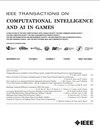使用边界查找跳跃点搜索优化
Q2 Computer Science
IEEE Transactions on Computational Intelligence and AI in Games
Pub Date : 2016-09-01
DOI:10.1109/TCIAIG.2015.2421493
引用次数: 10
摘要
在需要快速在线搜索算法的动态环境中,基于缓存的寻路算法失去了很多优势。跳点搜索(JPS)就是这样一种快速算法。它的工作原理是在路径扩展期间消除大多数地图节点的评估。边界查找跳点搜索(BL-JPS)是提高JPS速度的一种改进。BL-JPS记录障碍物边界的位置,并通过直接查找来消除JPS算法中搜索跳跃点所涉及的大部分迭代。通过两组实验,验证了BL-JPS在静态和动态环境下的效果。并对动态环境下JPS+缓存重建的不同方法的效果进行了评价。结果表明,BL-JPS总体上比JPS快得多。在静态环境中,它比JPS+慢,但在动态环境中,对于单个搜索,BL-JPS优于JPS+。当搜索多条路径时,缓存重建的影响逐渐主导了搜索速度的影响,导致JPS+再次变得更快。然而,结合JPS+和BL-JPS提供了一个非常快速的寻路算法(BL-JPS+),在一系列地图类型和搜索路径数量上优于JPS+。本文章由计算机程序翻译,如有差异,请以英文原文为准。
Optimization Using Boundary Lookup Jump Point Search
Cache-based path-finding algorithms lose much of their advantage in dynamic environments where fast online search algorithms are required. Jump point search (JPS) is such a fast algorithm. It works by eliminating most map nodes from evaluation during path expansion. Boundary lookup jump point search (BL-JPS) is a modification that improves the speed of JPS. BL-JPS records the positions of obstacle boundaries and uses these via direct lookup to eliminate much of the iteration involved in searching for jump points in the JPS algorithm. Two sets of experiments are presented, demonstrating the effects of BL-JPS in both static and dynamic environments. The effects of different approaches to cache rebuilding for JPS+ in dynamic environments are also evaluated. Results show that BL-JPS is generally much faster than JPS. It is slower than JPS+ in static environments, but in dynamic environments, BL-JPS outperforms JPS+ for a single search. When multiple paths are searched, the effects of cache rebuilding gradually dominate the effects of search speed, resulting in JPS+ again becoming faster. However, combining JPS+ with BL-JPS provides a very fast path-finding algorithm (BL-JPS+) that outperforms JPS+ over a range of map types and numbers of paths searched.
求助全文
通过发布文献求助,成功后即可免费获取论文全文。
去求助
来源期刊

IEEE Transactions on Computational Intelligence and AI in Games
COMPUTER SCIENCE, ARTIFICIAL INTELLIGENCE-COMPUTER SCIENCE, SOFTWARE ENGINEERING
CiteScore
4.60
自引率
0.00%
发文量
0
审稿时长
>12 weeks
期刊介绍:
Cessation. The IEEE Transactions on Computational Intelligence and AI in Games (T-CIAIG) publishes archival journal quality original papers in computational intelligence and related areas in artificial intelligence applied to games, including but not limited to videogames, mathematical games, human–computer interactions in games, and games involving physical objects. Emphasis is placed on the use of these methods to improve performance in and understanding of the dynamics of games, as well as gaining insight into the properties of the methods as applied to games. It also includes using games as a platform for building intelligent embedded agents for the real world. Papers connecting games to all areas of computational intelligence and traditional AI are considered.
 求助内容:
求助内容: 应助结果提醒方式:
应助结果提醒方式:


